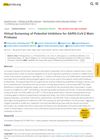8 citations,
June 2021 in “Annals of internal medicine” Experts recommend a team-based approach to treat patients with long-lasting COVID-19 symptoms and emphasize the need for ongoing research.
21 citations,
May 2019 in “Pediatrics in review” People with primary immunodeficiencies often have frequent, severe, or unusual infections and may need special tests and management strategies.
 16 citations,
December 2021 in “Frontiers in Endocrinology”
16 citations,
December 2021 in “Frontiers in Endocrinology” Sex hormones may affect COVID-19 severity, with estrogen possibly reducing risk and testosterone potentially increasing it.

The document concluded that certain compounds might strongly bind to and potentially inhibit a key SARS-CoV-2 protein, but further testing is needed.
 4 citations,
October 2022 in “Nutrients”
4 citations,
October 2022 in “Nutrients” Personalized diets, like the Mediterranean Diet and low carb diets, can help manage PCOS symptoms in obese women, and probiotics may enhance weight loss and improve metabolic health. More research is needed to find the best diet strategies.
1 citations,
August 1998 in “Pediatrics in review” Understanding cultural practices and skin reactions is crucial for diagnosing and treating skin conditions in children with dark skin.

Antiandrogens might help prevent or treat COVID-19 by blocking the virus's entry into cells.
1 citations,
January 2018 in “Advances in cancer prevention” Preventing cancer involves lifestyle changes, vaccinations, early screening, and understanding cancer's molecular basis.
 February 2024 in “BMJ Open”
February 2024 in “BMJ Open” The study concluded that different treatments reduced post-COVID symptoms over time and that factors like age, severity, and comorbidities affect symptom risk.
222 citations,
January 2003 in “Critical Reviews in Therapeutic Drug Carrier Systems” Ethosomes can safely and effectively deliver various drugs deep into the skin.
 16 citations,
March 2022 in “Archives of Toxicology”
16 citations,
March 2022 in “Archives of Toxicology” Botulinum and tetanus neurotoxins are better understood now, with updated information on their effects and treatment.
 1 citations,
January 2022 in “Health”
1 citations,
January 2022 in “Health” COVID-19 has widely affected health, various industries, and the economy, but also led to more remote work and less pollution.
 October 2023 in “Microorganisms”
October 2023 in “Microorganisms” Nirmatrelvir/Ritonavir treatment may lead to a weaker immune response to COVID-19, but doesn't affect the chance of rebound.
 August 2023 in “International Journal of Molecular Sciences”
August 2023 in “International Journal of Molecular Sciences” Liposomes show promise for delivering CRISPR for gene editing but face challenges like delivery efficiency and safety concerns.
 January 2023 in “Revista Da Associacao Medica Brasileira”
January 2023 in “Revista Da Associacao Medica Brasileira” The document concludes that women's health needs a holistic approach, considering all life stages, promoting lifestyle changes, regular exercise, proper diet, and vaccinations, with health professionals playing a key role in education and guidance.
July 2011 in “Journal of Pediatric and Adolescent Gynecology” A 15-year-old girl has a skin condition causing blisters on her feet, likely inherited from her family.
 April 2023 in “Journal of Investigative Dermatology”
April 2023 in “Journal of Investigative Dermatology” Booster shots of mRNA vaccines for COVID-19 increased protective antibodies without worsening autoimmune skin conditions in patients.
 260 citations,
January 2019 in “Pharmaceutics”
260 citations,
January 2019 in “Pharmaceutics” Niosomes are a promising, stable, and cost-effective drug delivery system with potential for improved targeting and safety.
 159 citations,
March 2014 in “Journal of The American Academy of Dermatology”
159 citations,
March 2014 in “Journal of The American Academy of Dermatology” Some skin medications are safe during pregnancy and breastfeeding, but others can harm the baby and should be avoided.
 February 2022 in “International journal of KIU”
February 2022 in “International journal of KIU” Certain genes and nutrients like vitamin D, zinc, and omega fatty acids affect COVID-19 severity and infection risk.
 February 2021 in “International Journal of Research in Dermatology”
February 2021 in “International Journal of Research in Dermatology” COVID-19 can cause skin symptoms that might help spot the virus early, and treatments for it can also affect the skin.
 August 2018 in “bioRxiv (Cold Spring Harbor Laboratory)”
August 2018 in “bioRxiv (Cold Spring Harbor Laboratory)” Existing drugs, including a blood pressure medication, show promise as new treatments for influenza.
 4 citations,
October 2020 in “Research Square (Research Square)”
4 citations,
October 2020 in “Research Square (Research Square)” Early treatment with certain drug combinations improved COVID-19 outcomes and prevented severe disease in males, including those at higher risk.
 19 citations,
March 2018 in “Expert Opinion on Drug Safety”
19 citations,
March 2018 in “Expert Opinion on Drug Safety” Most treatments for spondyloarthritis are safe, but monitoring and careful selection based on patient risks are important.
 March 2010 in “Anti-inflammatory & anti-allergy agents in medicinal chemistry”
March 2010 in “Anti-inflammatory & anti-allergy agents in medicinal chemistry” Biologic agents can be effective for rheumatic diseases but have risks like infections and require careful monitoring and patient information.
 273 citations,
May 2017 in “The Lancet”
273 citations,
May 2017 in “The Lancet” Some drugs can cause rare but potentially deadly skin reactions, and early treatment and avoiding the drug again are key.
 139 citations,
December 2020 in “Cell Stem Cell”
139 citations,
December 2020 in “Cell Stem Cell” Male hormones affect COVID-19 severity and certain drugs targeting these hormones could help reduce the risk.
 61 citations,
January 2015 in “Hormones”
61 citations,
January 2015 in “Hormones” Liraglutide caused significant weight loss in some obese women with PCOS, especially those with severe obesity and insulin resistance.
 53 citations,
June 2012 in “Annales d'Endocrinologie”
53 citations,
June 2012 in “Annales d'Endocrinologie” The document concludes that recognizing and properly diagnosing lipodystrophy syndromes is crucial for effective management and treatment.
 21 citations,
January 2021 in “Therapeutic Advances in Endocrinology and Metabolism”
21 citations,
January 2021 in “Therapeutic Advances in Endocrinology and Metabolism” Testosterone may have a dual role in COVID-19, potentially worsening outcomes in men, and testosterone therapy could help some patients, but more research is needed.























